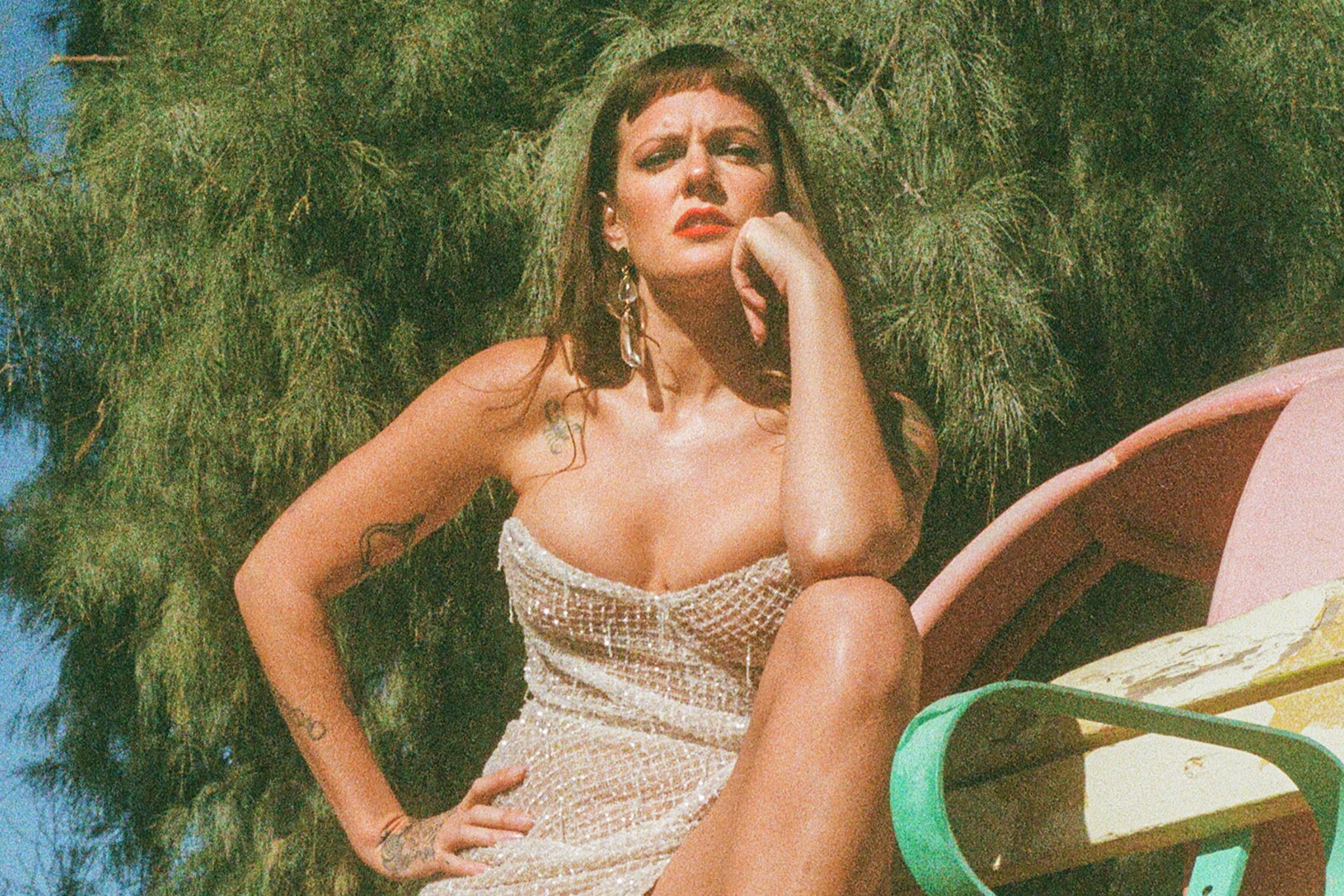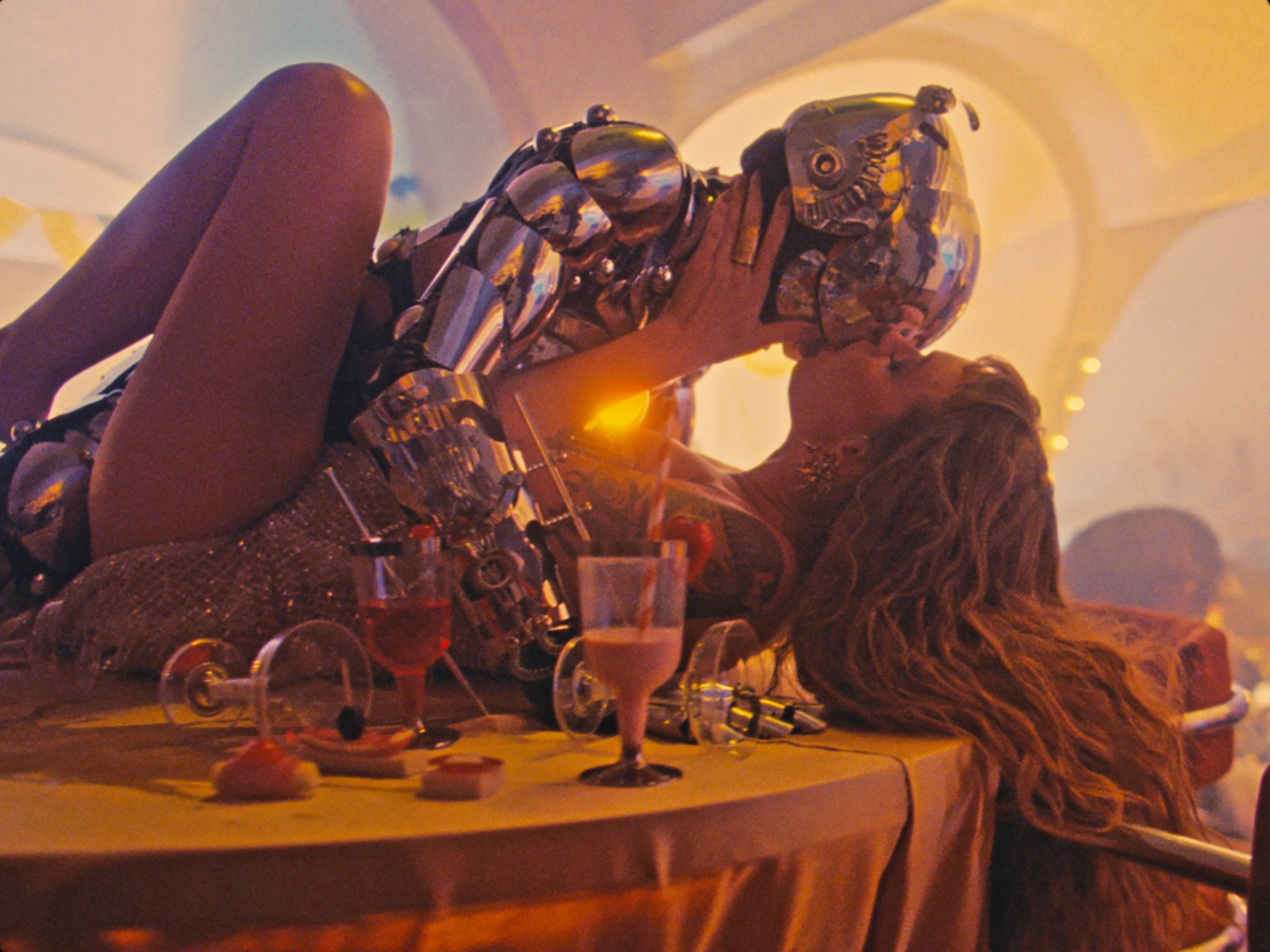Tove Lo: ‘There’s a little bit of a sociopath living in me. I think you need that to be a pop star’
The Scandi-pop behemoth has cornered the market in bacchanalian bops for more than a decade. She speaks to Adam White about her new album, the traumas she’s only just opening up about, and how an artificial phallus made her feel more powerful than normal


Your support helps us to tell the story
From reproductive rights to climate change to Big Tech, The Independent is on the ground when the story is developing. Whether it's investigating the financials of Elon Musk's pro-Trump PAC or producing our latest documentary, 'The A Word', which shines a light on the American women fighting for reproductive rights, we know how important it is to parse out the facts from the messaging.
At such a critical moment in US history, we need reporters on the ground. Your donation allows us to keep sending journalists to speak to both sides of the story.
The Independent is trusted by Americans across the entire political spectrum. And unlike many other quality news outlets, we choose not to lock Americans out of our reporting and analysis with paywalls. We believe quality journalism should be available to everyone, paid for by those who can afford it.
Your support makes all the difference.Tove Lo is describing the rubber dildo she wore in the Nevada desert. “It was this art piece, and I was so honoured to put it on,” says the Swedish pop Svengali. “It was basically a corset with this kind of… dick attached.” She scrunches her expression, as if that’s not quite correct. “A dick-thong… belt?” She gives up. “It was a strap-on, pretty much.”
In the visual for “2 Die 4”, a track from her fifth album Dirt Femme, Lo wanted to depict masculinity and femininity all at once. Or, as she puts it: “Wonder Woman with big dick energy”. So she slipped on a bodysuit and that bulbous gold member, ignored the early morning chill in the air and the tourists on the horizon, and set about strutting. How did she feel? “I would say…” She smiles. “I felt powerful.”
Lo, who was at the vanguard of the Scandi-pop boom in 2014, talks of artificial phalluses as casually as reciting a shopping list. Her music has always been like that, too: a decade and counting of bacchanalian ecstasy and nocturnal self-destruction disclosed with unfussy honesty: “Habits (Stay High)”; “Disco Tits”; “Lady Wood”; “Hey You Got Drugs?”. Murky synths chug along beneath icy, distorted vocals, before exploding into glittery production in her choruses. The inescapable tracks she writes with other artists – such as Dua Lipa’s “Cool”, Lorde’s “Homemade Dynamite” or Ellie Goulding’s “Love Me Like You Do” – are often far cleaner. Bracing clarity is traded for PG ambiguity, like a blur effect on video footage of a middle finger. Only when she’s on her own do you hear the full Tove Lo: provocative, confessional, heated.
We’re sat in her label’s London office to talk about Dirt Femme. It’s one of the hottest days of the summer, and the 34-year-old is dressed in an ice-blue shirt horizontally slashed to ribbons. It’s as if she’s arrived from a fight with Zorro. Lo’s look is busy with detail, her left hand decorated in a tattoo of a lynx, her eyes accented with sharp lines of black mascara. She wears a septum ring; jewels and bangles glisten. There was a time she’d have rather disappeared into the background.
“I didn’t want people looking at me,” she remembers. “I used to want to look like I didn’t care how I looked. Glamour was boring to me. I wanted minimal make-up. It freaked me out too much.” She links that feeling – now firmly vanquished – with her battles with her body image. It’s a story she’s danced around in public for 10 years, but which dominates the best track on Dirt Femme, the coruscating “Grapefruit”. It’s a deceptively upbeat banger, its thudding synth line disguising lyrics about self-loathing and an eating disorder that nearly destroyed her. It was making her acting debut as a “starving prostitute” in the Swedish film The Emigrants – shot in the early pandemic – that brought those struggles screaming to the front of her consciousness again. “I had to lose weight for it,” she remembers. “Not a ton, but I had a very short time to lose it. I went on a diet for the first time in 10 years and it triggered so many memories for me.”
Lo hit her rock bottom at age 17, soon after studying at a music school in Stockholm. She may have wanted to become a star back then – this was a few years before she’d write songs alongside impresarios such as Max Martin and sign her own record deal with Island Records – but she’s grateful now that she wasn’t shot out of a cannon into instant teen fame. “If I’d have been successful at 17, when it was the worst for me, I’d be sick to this day,” she says. “There is no way I could have handled all that criticism – the dissecting of your looks, your body, your face. Or being in front of a camera on days when you hate yourself.” She says she’s able to shrug off the comments made to her later on, like the make-up artist who claimed her right eye is “way lower” than her left. Or the one who tried to “get rid of this little double chin”. But if she’d heard those things as a teenager? “They would have stuck with me for the rest of my life.” Lo’s relationship to food and her own body is better today, and she didn’t fall back into disordered eating while acting. Rather, it sparked a bout of creativity and gratitude. “That I went through it and worked so hard on getting well,” she says. “I’ve been on the other side of it for so long now.”
When you’re a performer, there’s obviously narcissism. It doesn’t all have to be bad, but you have to admit that it’s there
Dirt Femme is about Lo exorcising all of the apparent contradictions to her femininity. It charts her reluctant embrace of marital convention (“You are the love of my life / But I can’t be no Stepford wife”), her relationship regrets (“I’m to blame all along … left our love to die”) and her casual cruelty. In the video for the album’s first single “No One Dies from Love”, Lo love bombs a robot assistant, allows the machine to develop human feelings for her, then cruelly drops her for a newer cyborg. A more predictable route would be to make Lo the hero of the clip, rather than the heartbreaker. But, she says, that wouldn’t have been authentic to who she’s been in the past.
“I’ve been a selfish asshole, and I’ve dated selfish assholes,” she laughs. “But I think I would always blame it on them, when… if it happens to you every time, then it’s probably you.” She admits that her romantic history is rocky. “It’s one of my biggest fears that I’m being cold or selfish and no one is telling me,” she says. “But I think it’s been hard for people in the past to handle what I do and how I portray myself. I talk about everything so openly, and it takes a special person to handle that.”
The special person in question is producer Charlie Twaddle, whom Lo married in 2020. “I do not want to f*** this up,” she admits. “I’m so scared of being a bad person towards him. I don’t mean cheating or anything like that, but more to have everything revolve around me. Or thinking that nothing else comes before my music. Luckily, he’s a very, very creative person, and he has his own journey. We’re just very in sync.” I suggest that it’s probably a good thing to be aware of her own failings. At least then you can keep them in check. “It’s such a give and take,” she says. “There’s a little bit of a sociopath living in me, but I think you have to be to be an artist or a pop star.” She lets out a nervous giggle. “I want thousands of people to scream when they see me, you know? When you’re a performer, there’s obviously narcissism. It doesn’t all have to be bad, but you have to admit that it’s there. Otherwise, you wouldn’t do it.”
Enjoy unlimited access to 100 million ad-free songs and podcasts with Amazon Music
Sign up now for a 30-day free trial
Enjoy unlimited access to 100 million ad-free songs and podcasts with Amazon Music
Sign up now for a 30-day free trial
It’s a kind of pragmatism that makes her transition to “record label boss” no surprise. Dirt Femme is Lo’s first release on Pretty Swede, the label she founded once her contract with Island came to an end. Going independent, though, doesn’t mean she’s wary of what a major label can do for an artist. “There are a lot of things wrong with them, but I still think they have fair points to make,” she admits. “I needed them to help build the platform I have now.” Yes, they found some of her creative decisions confusing, but never enough to outright stop her from doing them. She re-enacts a typical back-and-forth for me. “‘I’m gonna masturbate in this video and if you say anything about it, I’ll just…’” She lets out a comic roar. “That was the way it went, and they never tried to stop me. It just meant that I ended up having to pay for a lot of it myself.”

She’s aware that her experience is a bit of an exception to the rule, though. I’m reminded of a litany of young, often female pop stars stuck in major-label limbo for years at a time – notably Raye, who told The Independent this year of the “real mindf***” of being stuck in a four-album deal with a label that wouldn’t release her music and gave other artists her songs. Lo’s seen it happen to any number of her peers. “[They] get stuck in [situations] where labels say: We don’t like the album you made that we didn’t even help you make, and you’re not gonna be allowed to put it out. That’s my actual nightmare.”
As Lo shakes her head, she gets fired up. “Mainstream is always the goal [for majors], which means that you’re asked to shave off all the things that people might not be ready for,” she says. “I love to stir people’s feelings around. I want my songs to affect people. Whether it makes them want to dance, or makes them want to f***, or makes them want to cry – I just want it to be intense. Like if someone says, ‘Yeah, that song’s cute, I put it on in the background’... ” She looks nauseated. “I am not f***ing background music! I want you to blast it.”
“Pop should be confronting,” she sighs. Just in case the strap-on didn’t make that clear enough already.
‘Dirt Femme’ is released on Friday 14 October



Join our commenting forum
Join thought-provoking conversations, follow other Independent readers and see their replies
Comments